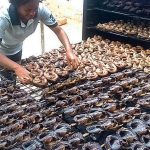
On June 29, a dull, somewhat grainy picture of Nigerian activist Nnamdi Kanu in handcuffs began circulating on the internet, shortly after what seemed like unlikely news about his arrest in and extradition from a yet-to-be officially disclosed foreign country—possibly Kenya or Ethiopia—had broken. Kanu is the leader of the Indigenous People of Biafra (IPOB), a separatist organization in Nigeria agitating for the secession of the country’s east.
Kanu was first arrested in 2015 on charges of terrorism and disappeared in 2017 in the middle of his trial. His arrest and extradition were not surprising, giving the vigor with which Nigeria’s government acts against dissidents and the resources it’s willing to spend in doing so. But his arrest added fuel to an already potentially explosive situation.
The political temperature in Nigeria is scalding, with a wave of secessionist movements across the country stemming from a rapidly degenerating and perhaps intractable political and social conflict between the federal government and constituent groups.
The largest ethnic groups are the Yoruba, Hausa, and Igbo, but there are more than 300 ethnic groups and more than 500 languages. This ungainly coalition was forced together by colonialism, and today, the center is barely holding. Several groups want out of the whole arrangement.
There is the IPOB in the southeast, a blooming movement for the Yoruba in the southwest, and other groups in the south, home to the majority of the country’s oil reserves and a significant source of Nigeria’s revenue. IPOB is the most significant force among these groups and is gradually becoming more operationally sophisticated and garnering strong public support, especially with its increasing military actions in the eastern region.
The sustainability of Nigerian statehood itself has long been a subject of debate.
Secession is not a new problem in Nigeria. From 1967 to 1970, a devastating civil war raged after the eastern region of Biafra—home to the Igbo, a people who make up about a quarter of Nigerians—attempted to secede. Reconciliation efforts were made afterward, such as the creation of the National Youth Service Corps in 1973, a one-year mandatory program that remains in place for Nigerian graduates to live and work elsewhere in the country to promote national unity.
Even before the great fire of that war, there were sparks, such as Isaac Boro, an Ijaw separatist leader who founded the Niger Delta Volunteer Force in 1966 and led its 160-person army to a three-day secession of the Niger Delta over the partnership between the then-military government and foreign oil companies—a relationship that continues to this day. The military quickly quenched it and sentenced the leaders to death.
Given the country’s size, colonial origins, and diverse population, the sustainability of Nigerian statehood itself has long been a subject of debate. Initially, Nigeria’s model was far more federal, allowing for the possibility of separate policies and local needs. But in 1966, Maj. Gen. Johnson Aguiyi-Ironsi promogulated the unification decree that discarded the regionalism practiced since independence in 1960 to discourage “tribal loyalties and activities, which promote tribal consciousness and sectional interests and which must give way to the urgent task of national reconstruction.”
Regionalism allowed each region to control its resources and develop at its own pace. Since centralization—especially under military rule—tribal and ethnic differences have created continual crises and led to public discussion about the “negotiability” of Nigeria’s statehood.
Wole Soyinka, the 1986 Nobel laureate winner, discarded the idea of non-negotiability in a 2017 address. “The claim that the unity of Nigeria is non-negotiable is a false statement,” he said. “Negotiation involves ensuring that there’s no marginalization. Negotiation involves ensuring that the major components of the country are not feeding on the center.”
Fueling these separatist movements is the government’s sense of impunity, widespread poverty, chronic underdevelopment, and worsening levels of insecurity—especially the threat posed by the attacks of nomadic Fulani herdsmen.
The Fulani ethnic group is one of the largest, scattered across West Africa and the Sahel. Culturally nomadic, they travel across long swathes of land for business and settlement.




